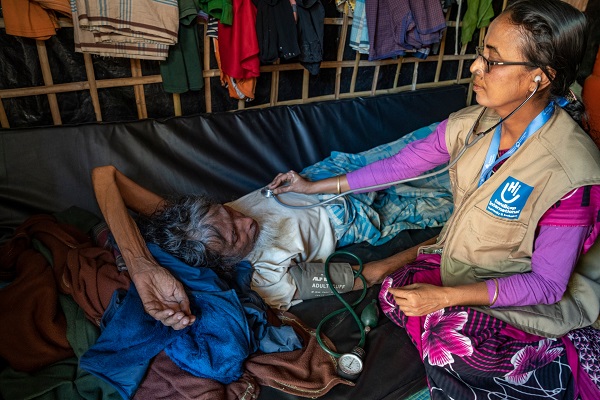 70-year-old Furkan Ahmed being examined by a HI nurse at Ukhiya refugee camp at Cox's Bazar in Bangladesh in 2018;
Credit: Abir Abdullah / HI
70-year-old Furkan Ahmed being examined by a HI nurse at Ukhiya refugee camp at Cox's Bazar in Bangladesh in 2018;
Credit: Abir Abdullah / HI
Just ahead of World Refugee Day, celebrated annually on 20 June, Luxembourg NGO Handicap International (HI) has highlighted some of the work it has been carrying out to support the disabled in refugee camps worldwide.
According to the United Nations High Commissioner for Refugees UNHCR, around 15% of the world's 79.5 million refugees have a disability. Often isolated, discriminated against and marginalised, these people have seen their problems aggravated by the COVID-19 pandemic and the resulting restrictions.
In the field, HI teams have noted that local communities are quick to reject refugees, especially those who are disabled. Worse still, overcrowded and unsanitary refugee camps around the world are not at all suited to deal with the threat of COVID-19. The poor and malnourished people who are crammed together there have only limited access to services - a particularly favourable environment for transmission of coronavirus. For example, it is impossible to respect social distancing in Cox’s Bazar in Bangladesh (40,000 people / km²) or in Al Hol in Syria (37,570 people / km²). For comparison purposes, the density of Luxembourg City is 2,376 inhabitants / km².
The NGO also pointed out that people with disabilities often have difficulty accessing information: in the Kiziba camp in Rwanda, around 70 people suffer from hearing and speech impairments and receive no information about COVID-19 (no sign language interpretation).
In addition, access to clean water for simple hand washing, so crucial in the fight against the virus, is a daily struggle in these camps. Indeed, people in wheelchairs, for example, do not have access to everyday hygiene items.
HI added that coronavirus containment measures have interrupted, limited or hindered humanitarian services. And yet many refugees with disabilities are totally dependent on humanitarian aid. Indeed, an assessment by the UNHCR on the impact of COVID-19 in Lebanon in April 2020 revealed that 84% of refugees with disabilities considered food insecurity to be their main concern.
To provide specific assistance to people with disabilities in refugee camps, HI created "disability and vulnerability relays" about fifteen years ago. In Sri Lanka, Indonesia, Iraq, Burma, India, Haiti, Gaza, Pakistan, the Philippines, Lebanon, Jordan, Mali and the Democratic Republic of the Congo, these relays take the form of temporary and flexible structures (a tent or shelter) installed in the heart of the community.
HI teams are mobile and have the role of ensuring that aid reaches vulnerable people, including the disabled, the elderly and single mothers. The disability and vulnerability relays thus offer psychological assistance and possibly economic support, the assurance of receiving the same level of humanitarian aid (shelter, food, hygiene) as all other refugees / displaced persons, recording of their specific needs and referral to specialised services and follow-up. Technical aids such as crutches and wheelchairs, as well as basic rehabilitation care, are also provided.
These structures dedicated to refugees are now systematically deployed in the areas where HI is mobilised.








